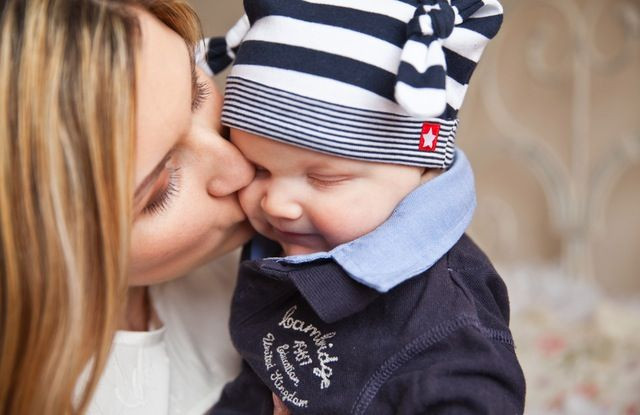Who Will You Marry? Opposite Sex Parents Influence Who You Find Sexually Attractive Via Facial Features, Personality Traits

Many of us are familiar with this feeling: We go on a blind date, grab dinner and drinks, and in between laughs and smiles, we feel instantly connected to this total stranger, like we’ve known him for years. After a few dates, we begin to feel so comfortable around him we wonder how we fell so hard and fast for someone we just met. Maybe we really have known him all our life — he reminds us of a parent.
We all have a type, whether we know it or not. The physical attributes and the personality traits we’re instinctively attracted to are deeply rooted in the relationships we have with the people who raised us. Similar to animals, such as birds, mammals, and fish, we learn what a suitable mate looks like based on the appearance of our parents. As human beings, we move toward the familiar with potential partners based on our primary connections since birth.
Science also agrees: We’re more likely to marry someone similar to our opposite sex parent.
Like Parent, Like Spouse
Gender Roles Are Modeled In Early Childhood
We learn that unstated rules exist between men and women from our opposite sex parents — our parents teach us their own personal versions of these rules, whether positive or negative. Erika Martinez, a psychologist at Envision Wellness in Miami, Fla. explains that parents define our concepts of masculinity and femininity.
“I find that people tend to date partners with traits similar to their opposite gender parents because they internalized their parent's behavior and demeanor as the foundation for their concept of male' or 'female'” Martinez told Medical Daily.
It’s the quality of exposure, or modeling, that matters, not the quantity, says Fran Walfish, Beverly Hills family and relationship psychotherapist, author of "The Self-Aware Parent," and co-star on WE TV’s Sex Box to Medical Daily.
Questions, “such as, is the parent possessive and smothering; anxious or calm; abusive or nurturing; stunning or neglectful; stifling or supportive of growth,” influence what the child will look for in a future mate, according to Walfish.
For example, a 2002 study in Personality and Individual Differences found people who report more positive childhood relationships with a parent are more likely to be attracted to partners who resemble that parent.
The subconscious desire to be with someone similar to our parents is seen in animals too, including birds, mammals, and fish. A study in Nature found sheep raised by goat mothers preferred the company of goats over sheep as adults, and vice versa.
Similarly, a 2004 study in Proceedings of the Royal Society B Biological Sciences noted this phenomenon is also seen in people who were adopted. The researchers found adopted women tended to choose husbands who looked like their adoptive fathers. The effect may be modified by the quality of the father-daughter relationship during childhood. Daughters who received more emotional support from their adoptive father were more likely to choose men similar to their father than those whose father provided a less positive emotional environment.
A Mother’s Influence
A mother has the power to influence how both her male and female children view intimate relationships. The learned rules and the first relationship we have in this world (our mother or guardian) influence the subconscious attraction we develop toward a potential partner, also known as “object relations.” The theory, diverging from psychoanalyst Sigmund Freud’s belief that human are motivated by sexual and aggressive drives, emphasizes interpersonal relationships, primarily in the family and especially between mother and child.
"The idea is the first relationship for the infant that comes into the world is the mother (the one who feeds) originally, or most frequently the one who breastfeeds," said Walfish.
It is how the mother relates and responds to the infant that sets the tone for the type of partner he or she will grow to be attracted to. For example, when we’re in a committed relationship, we’re more likely to repeat the relationship repertoire we learned from our mother. We repeat both the behaviors she modeled for us, and how we were conditioned to behave in relation to our mother.
In men, mothers influence the type of woman, both physically and personality-wise, their sons are drawn to. In women, it is the tone the mother sets in a marriage and home with her spouse, that will impact what they consider normal, or acceptable behavior.
“If a mother stays in an abusive relationship with her husband, her kids will learn ‘it’s OK to deal with this kind of behavior',” said Walfish.

Abusive Consequences
Those with negative childhood relationships may subconsciously seek abusive relationships in adulthood to right their wrongs. Freud theorized we continue to be attracted to the same negative experience because we want to revisit the “scene of the crime” and resolve our parent-child issues in an intimate relationship, but we’re not aware we’re doing it.
For example, a girl with a “busy” father who was not that emotional may be drawn to a man whose love has to be earned or deserved. The same concept can be applied to boys too: a boy with an overbearing mother may find that he has to walk on eggshells around his partners to avoid being yelled at.
The theory of “repetition compulsion” explains why some people choose mates that resemble their parents as a means to make amends for an unhappy childhood. Many people are drawn to abusive types because they’re familiar.
“Sometimes you’ll find yourself or others choosing a “type” who is abusive or addicted or philandering — because it’s what they know from their family of origin, and it’s what they’re used to," April Masini, relationship and etiquette expert, told Medical Daily.
We think we’ll be able to heal this way, but truthfully, we’re no more equipped to deal with the situation than when we were as a child. This is because we are not making any positive efforts to get to the root of the problem via psychotherapy or other alternatives. Instead, we’re going back to the same type of toxic relationship in hopes it will be better the next time around.
Sexual Imprinting
Harvard researchers say our brain actually takes note of two main characteristics first: race and gender. They found different patterns of activation in the brain region called fusiform face area, or FFA for short, when participants viewed black and white faces, and female and male faces. This manifests itself when we choose a partner.
A 2006 study in the Journal of Social and Personal Relationships observed we often pick partners who are members of the same ethnic group as our opposite sex parents. In mixed race marriages among partners who had divorced and remarried, two-thirds of the time, people picked partners with the same ethnicity of their opposite gendered parent, despite how many times they got married.
This suggests if we spend a lot of time being exposed to a particular kind of male or female face, it’ll be embedded into our psyche, making us more likely to favor physical traits too. Whether it’s tall, dark, and muscular, or short, fair, and slight, we’re all automatically drawn to a type.
Evidently, these preferences are reflected in the people we date and associate with on a daily basis. Subconsciously we develop a physical attraction for those who resemble our parents since they are the first faces we see as infants. Faces that are similar to those of our parents are classified in our minds as familiar and nurturing.

Attraction to parental traits has been noted in several studies. For example, researchers found we’re drawn to self-similar characteristics and opposite gendered parent traits. These features were found to positively correlate with the participants’ actual partner characteristics for both men and women. For example, a boy of a brown-eyed, brunette-haired woman is more likely to date a brown-haired, brunette woman himself.
Men are more likely to choose women who resemble their mothers. Previous research has delved into this phenomenon by comparing more than 300 facial photographs of family members and controls. Judges were instructed to match wives to their mother-in-law to determine if there is any resemblance between the two women. The findings revealed there was a higher degree of similarity seen between the husband’s mother and the husband’s wife than between the husbands and their wives.
The degree of facial similarity is also focused on different areas of the face, depending on gender. Women are more likely to look for similarities to their fathers in centers of men’s faces, while men looked for similarities to their mothers in the lips and jaws of potential partners.
The subconscious preference for a partner that resembles our opposite sex parents’ physical features could also be a biological response.
A Biological Impulse
Researchers suggest this could be driven by an impulse to pass on our genes. A 2009 study in Proceedings of the Royal Society B: Biological Sciences found we use our opposite sex parent as a template for a partner. Selecting a love interest who looks similar to a parent helps us promote our own genes without committing incest.
Interestingly, even the hairiness of a woman’s father can correlate positively with that of their significant other. This suggests a woman’s preference in relation to male hairiness may partially be due to the result of sexual imprinting on paternal body hair. Researchers also theorize this preference could be heritable.
The biological impulse for preserving our genes is also reflected in the height of our partner. A Japanese study found sexual imprinting influences our preference in body height for those we date. In women, a mate with a similar height to a father, especially if he’s tall, will ensure potential offspring, or children, will possess this trait, and therefore, be better equipped for survival.
Dr. Paul DePompo, a psychologist and author of The Other Woman’s Affair, suggests this is an indirect way we’re linked to our parents.
“We see exaggerated traits that connect to our parents, and these can be physical characteristics and also be a way of behaving that relates to how our parents acted,” he told Medical Daily.
Marrying A Parent: The Verdict
So, are we likely to marry our parent? Not necessarily. Parents who want to show their children a good example need to work on their marriage, and adults who had poor examples in childhood will have to work hard to avoid the same mistakes.
"If you want very badly to have a different and better relationship than the ones you grew up with, you can accomplish that if you go about it very consciously” said Walfish.
Ideally, our parents should act as role models for what men and women are like. We develop habitual ways of relating to the parent (either male or female) that we’re used to, and then we relate like this with other people. Walfish warns parents have the power — for better or for worse — to influence their child’s preferences; this starts at an early age.
“Have a weekly date night and daily talk time with your spouse/partner. The foundation of your family is built upon the bricks and mortar of your marital relationship,” Walfish writes in “The Self-Aware Parent.”
If you do find the love of your life, you may want to send a thank-card to your great parents, or perhaps your great therapist.
Published by Medicaldaily.com



























